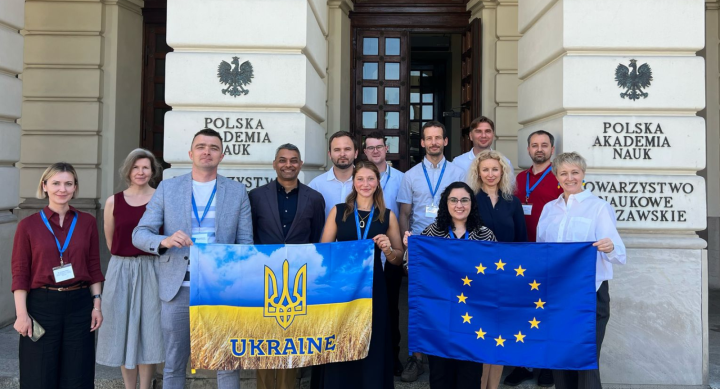
The LBJ School, in partnership with Polissia National University of Ukraine and the Ukraine Facility Platform, recently cohosted the international workshop A Policy Blueprint for Ukraine’s European Union Integration Workshop: Co-Creating Risk Reduction and Climate Adaptation Strategies in the Agriculture Sector.
Held at the Polish Academy of Sciences in Warsaw, the three-day workshop brought together agricultural experts from Ukraine, EU policy specialists and international researchers to address one of Europe’s most urgent challenges: how to align Ukraine’s agricultural recovery with EU climate and policy standards.
Led by Sachin Shah, Assistant Adjunct Professor at the LBJ School, along with Master of Global Policy Studies (MGPS) students Evan Samsky and Annabelle Sala, the workshop built on the LBJ School’s longstanding commitment to collaborative, evidence-based international policy development. Participants engaged in intensive scenario planning and implementation-focused discussions to produce concrete policy recommendations for Ukraine’s Ministry of Agrarian Policy and Food and relevant EU bodies.
Ukraine’s agriculture sector, home to 9% of the world’s black soil and a top global producer of sunflower, corn and wheat, is under immense pressure. War has rendered over 3 million hectares of farmland unusable due to landmines and destroyed 15% of the nation’s agricultural infrastructure. Climate change compounds the crisis: average temperatures have risen by 1.2°C over three decades, and drought affected 40% of Ukraine’s arable land in 2022 alone.
“Ukraine’s agricultural resilience is critical not just for national recovery, but for global food security,” Shah said. “This workshop focused on translating adaptation strategies into actionable policies that support both immediate recovery and long-term EU integration.”
The workshop was structured to guide participants from assessment to action. The first day focused on aligning Ukraine’s policy goals with the EU Common Agricultural Policy framework. The second day emphasized inter-institutional coordination and mapping out EU-aligned funding opportunities. The final day produced implementation roadmaps with clear timelines and accountability measures.
Key outcomes included plans for cross-ministerial coordination to combat fragmented agricultural policymaking and detailed recommendations on integrating climate-resilient techniques using EU funding mechanisms.
Co-convened by Dr. Olga Trofimtseva, an agricultural policy advisor at the Ukraine Facility Platform, the workshop ensured that Ukrainian voices were central to every phase of the conversation.
“We used scenario planning and institutional analysis to ensure that policy recommendations reflect both Ukrainian expertise and EU requirements,” Trofimtseva said. “This isn't about imposing external solutions—it's about building adaptive capacity from within.”
By the end of the year, a comprehensive policy brief will be completed that synthesizes recommendations across seven strategic areas: policy and institutional capacity, food security, sector resilience, climate-oriented agriculture, modernization and innovation and rural development.
This initiative adds to the LBJ School’s growing international portfolio, demonstrating the school’s commitment to working at the intersection of research, policy and global cooperation.

